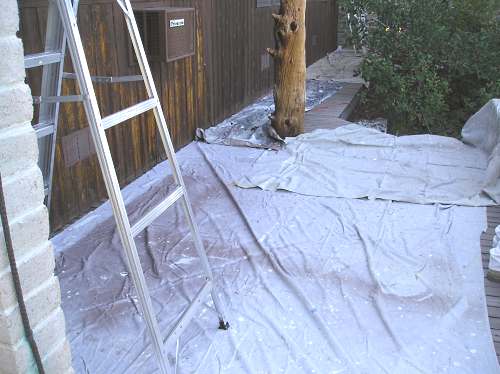Have you ever tried to paint your house without using drop cloths? It’s a sure sign of a non-professional. You may have learned the hard way that it takes a lot more effort to clean up misplaced paint spatters than it would take to catch those stray paint blobs with the right drop cloth.
Professional painters know. Paint splatters and drips can find the smallest uncovered area, even from across the room. You need to cover and protect your valuable property from sanding dust and paint splatters before starting any painting project.
Choosing The Right Drop Cloth
Drop cloths are available in 4 basic material types: Canvas, Paper, Paper/Poly and Plastic.
Canvas Drop Cloths
While plastic is a common choice with homeowners, professional painters choose canvas. A canvas drop cloth can be used for covering just about everything. Regular canvas, butyl and PVC backed canvas cloths are puncture resistant and will be superior at covering plants and bushes.
Butyl and PVC backed cloths are the best. These are canvas cloths with a rubberized coating on one side. Next to nothing can get through this barrier. The canvas protects the intended surface and absorbs the paint splatters.
Butyl backed cloths are less prone to slipping on slick surfaces. This makes butyl backed canvas drop cloths a great choice for tile, hardwood floors, and stairs where the need for gripping power is crucial. Use with butyl backing against the floor and the canvas side up.
How to Choose a Canvas Drop Cloth – Canvas drop cloths are usually made from recycled cotton fabrics. This makes them a green choice. The heavier the fabric and tighter the weave, the more durable and absorbent the cloth will be. You may feel that for a one-time paint job that the additional expense of butyl backing isn’t worth it. If you get paint on your furniture or floors, you may regret having gone with a cheaper drop cloth.
Paper Drop Cloths
Paper drop cloths are a cheap option that is an alternative for interior paint jobs. They usually last through one paint job. Paper is more slip resistant than plastic, so has the advantage of staying in place more effectively than plastic.
Paper drop cloths are not a good choice for exterior painting jobs. They pick up easily at the slightest breeze, exposing your sidewalk, plants and deck to paint. Even if you can secure the paper with tape, paper tends to tear when placed over landscape plants.
Paper/Poly Drop Cloths
Paper/poly drop clothes are a better choice for interior paint protection because the poly layer prevents any paint from soaking through the paper. Poly resists the penetration of most liquids.
Paper/poly drop clothes are a poor choice for outdoor applications for the same reason that paper doesn’t work well. Wind tends to move the drop cloth around, and it doesn’t work well for covering bushes and plants.
Plastic Drop Cloths
Plastic drop clothes are the best choice for covering furniture and other odd shaped objects. It’s also perfect at protecting brick and masonry surfaces.
Plastic drop cloths don’t work well for covering interior floors, though it will work if you have a very tight budget. It’s just too easy to trip on or shift out of place as you move around the room.
Plastic drop cloths are also a nightmare for protecting exterior surfaces (except for covering windows). You will spend more time chasing after then when a slight breeze takes them off to your neighbor’s house.
Also plastic is easy to cut and puncture. Using plastic to cover sharp objects will not work.
When it comes to choosing drop cloths, the professionals turn to canvas most of the time. A good canvas drop cloth is washable and very durable. And with a butyl or PVC backing, the drop cloth can resist almost any spill.
Your valuable items deserve the best protection the next time you paint. If you feel you can’t afford to invest in drop clothes for your painting job, see if your local equipment rental outfit has drop cloths for rent. Accomplishing the professional results you desire will pay off for years to come.


